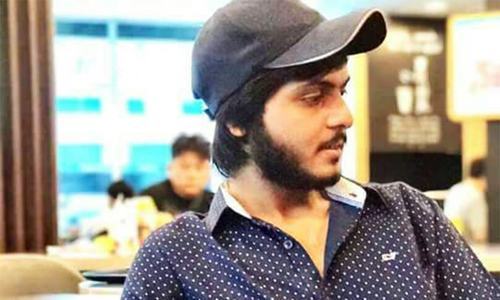A Karachi anti-terrorism court (ATC) on Tuesday issued bailable arrest warrants for a key prosecution witness, Madiha Kayani, in a case related to the murder of teenager Intizar Ahmed in a 'planned' encounter in the Defence Housing Authority (DHA) in 2018.
Nineteen-year-old Intizar was studying in Malaysia and had returned to Pakistan for his holidays. On January 13, 2018, he was in his car with a female friend (Kayani) when police in plain clothes had signalled him to stop. When he had failed to oblige, he was chased and shot dead in DHA. Kayani had managed to escape unscathed.
A couple of months after the killing, Kayani, in a video statement which went viral on social media platforms, appealed to the Rangers and other law enforcement agencies to provide her security.
“It was a planned murder,” she said of Intizar’s killing. “Since I am the only eyewitness to the incident and I reported that a man sporting moustache is the murderer, I am feeling insecure for my life,” she added.
Eight officials of the Anti-Car Lifting Cell (ACLC), including then station house officer Tariq Mehmood, inspectors Azhar Ahsan and Tariq Raheem, head constable Shahid, and constables Ghulam Abbas, Fawad Khan, Mohammad Daniyal and Bilal Rasheed were initially charged with the killing.
The matter came up before the ATC-XIII judge on Thursday, who is conducting the trial inside Karachi's Central Jail to record testimonies of the key prosecution witness and others.
However, Kayani failed to turn up to testify against the accused persons.
The state prosecutor and the investigating officer informed the court that the female witness had not been turning up to record her statement in the court despite issuance of repeated notices to her.
The court was also informed that Kayani's statement was an important piece of evidence since she was present with the victim in his car when he was shot dead by the accused persons.
Taking notice of her absence, the judge issued bailable arrest warrants for Kayani, directing the investigating officer to ensure the presence of the witness before the court on the next date of hearing (Oct 8) to record her statement.
All undertrial policemen were indicted on May 15, 2018, for the student's murder. Initially, the investigating officer of the case had named eight officials as accused persons in his report. However, he later left out head constable Abbas, contending that the constable was not present at the time of the incident.















































